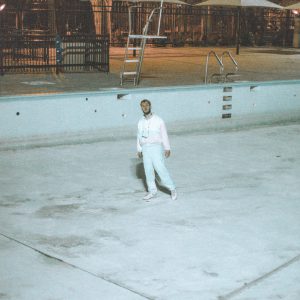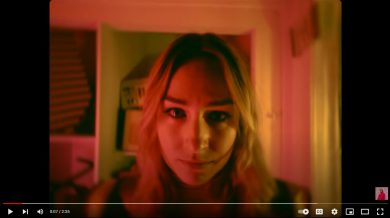 The album has been ready for almost a year, but Super Plage carefully chose the moment of its release: launched on March 31, Magie à minuit is the summer of 2023’s first album. It’s written in black letters over a pink background in his Bandcamp page bio: “Fuck winter.” He offers us 10 delicious pop-dance gems that make us want to play them on repeat, until we can finally hang out on our balconies – but whose lyrics are “slightly more personal, this time around,” as the singer-songwriter, a.k.a. Jules Henry, explained to us. “It’s an album that’s slightly more intimate and serene, but still lighthearted and corny.”
The album has been ready for almost a year, but Super Plage carefully chose the moment of its release: launched on March 31, Magie à minuit is the summer of 2023’s first album. It’s written in black letters over a pink background in his Bandcamp page bio: “Fuck winter.” He offers us 10 delicious pop-dance gems that make us want to play them on repeat, until we can finally hang out on our balconies – but whose lyrics are “slightly more personal, this time around,” as the singer-songwriter, a.k.a. Jules Henry, explained to us. “It’s an album that’s slightly more intimate and serene, but still lighthearted and corny.”
At first glance, Magie à minuit differs from its predecessors by the number of collaborations. Henry has a knack for picking the right people to work with: on his first three projects – Super Plage (2020), Super Plage II (2020) and Électro-vacances (2021) – the majority of his songs were duets. On this new project, only four out of 10 songs have featured guests. “Maybe it’s because this was created during lockdown?” he says, offering a guess. “There wasn’t a lot of partying going on during the 2021 holidays… I had fewer opportunities to see my friends while I was creating this album. On the other hand, it’s my album with the most guest musicians – Mélanie Venditti [who sang on Super Plage II] plays the viola and the theremin on this one.”
The trio Le Couleur, who featured on the song Touristes (on Électro-vacances), is back for an appearance on “Rue Dandurand,” a song that stands out for its four-on-the-floor tempo. “That song is the result of a succession of random events,” says Henry. “I wanted something that was really ‘dancefloor,’ and I’d come across this really dirty kick-drum sound. But in the end, the chords I chose to play over the rhythm took me in a completely different direction.” Which is to say more pop and festive, the title being the name of the street where the musician’s studio (which he shares with Le Couleur) is located. “It’s a great co-working space – we work hard during the day and party hard at night!
“You know,” he continues, “I listened to a lot of Georges Brassens, Georges Moustaki, and Nana Mouskouri all my life, and I feel like ‘Rue Dandurand’ is as much a club song as a ‘chanson française’ that evolves over several verses.” And therein lies the specificity of the project: Henry creates danceable pop music that, in an ideal world, would be in heavy rotation on commercial radio, while also claiming its lineage to the great tradition of Francophone “chanson.”
“I only discovered recording about 10 years ago,” Henry admits. “Before all that – the studio, the computers – there were the songs that I wrote on the guitar, and that’s the method I still use. I see my creations as songs, but instead of using guitars and drums, I use synths and electronic percussion. Some of my creations are really minimalist, lyrically, but I find that it leaves a lot of room for your imagination.” Such is the case with “+1” (featuring Meggie Lennon and Virginie B), “NYE,” “Safespace,” and “Attraction,” the last of which boils down to two or three sentences.
Throughout his recordings, Super Plage carved a comfortable niche for himself: each project never has more than 10 songs, totalling about 30 minutes of grooves. Yet, he always writes more than he needs. “I cut songs from every album I work on,” he says. “Not just because there are too many, but because I make a lot of bad ones! On the other hand, streaming could afford me the opportunity to explore different formats. I could give myself the goal of releasing three EPs, with three songs each, this year; and the next, a 25-track double album. The thing is, I think EPs get overlooked, while with double albums, people rarely make it to the 25th song. It’s too easy to skip the ones that don’t hook us, so that’s why I figure that 10 songs over a period of 30 minutes will mean people listen to the whole thing.”
So how does he distinguish a good song from a bad one? “Well, first, I’m my own first listener,” says Henry. “When I play it back, I ask myself, ‘Does this please you, or not?’ Then I play my demos to collaborators and close friends. I know how to recognize their enthusiasm about a song, so I rely on their opinion as much as my own. Some of them are very harsh, and even a smile from them will have great value; while others are more forgiving, and will like it too much, which is why I take their opinion with a grain of salt. My mom always loves everything I do, so I’m certainly not going to ask her which song shouldn’t make the album!”
